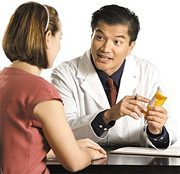What needs to be understood is that "off-label" doesn't just mean it hasn't been properly tested on children, but that it might be prescribed for a purpose for which it was never intended. Dr. Murphy says there are about 200 older drugs that have been studied in children, but new products come on the market all the time and their studies, while underway, will take time to complete. That means a lot of untested medications are made available to doctors for off-label prescribing to children.
The Consequences of Off-Label Prescribing
In hospitals and medical offices, pediatricians write off-label prescriptions every day with the best of intentions. They make an educated guess about which drug to prescribe and what would be an appropriate dosage for a child of a particular weight and age, hoping they're right. The problem with this practice is that the children can pay the price with the following:
- unexpected side effects;
- worsening of the original complaint;
- allergies to the chemicals; and
- even coma and/or death.
Unfortunately, the actual facts in this matter have been difficult to determine. The British Pediatric Surveillance Unit believes this could be due to many factors, including a reluctance to report, even in an anonymous way, the number of deaths due to off-label prescribing of drugs to children. However, the European Medicines Agency believes that there is sufficient evidence that harm actually occurs and is under-reported.
What it comes down to is whether a pediatrician's "best guess" as to dosage and efficacy of a drug is going to be good enough for parents, and whether they should be accepting, in blind faith, every prescription written.
The Chiropractic Factor
 Many parents report an improvement in their child's quality of life after beginning routine, family wellness chiropractic care. A healthy central nervous system results in a stronger immune system, which could mean less prescription drugs or other forms of drug therapy. So take a moment today to schedule a chiropractic screening for your children.
Many parents report an improvement in their child's quality of life after beginning routine, family wellness chiropractic care. A healthy central nervous system results in a stronger immune system, which could mean less prescription drugs or other forms of drug therapy. So take a moment today to schedule a chiropractic screening for your children.
Questions to Ask Your Pediatrician
Before accepting a prescription from your pediatrician, be sure to ask the following important questions and then thoughtfully consider whether to give your child that chemical.
- Would a wait-and-watch approach be advisable in this instance?
- Is this the only treatment available or do I have options that don't include drug therapy?
- What are the side effects of this drug?
- Has the drug been tested for pediatric use?
- Is this the use for which it was intended or are you prescribing this off-label?
- Can we begin with a smaller dosage and then increase it only if necessary?
Claudia Anrig, DC, practices in Fresno, Calif., and is on the board of directors of the International Chiropractic Pediatric Association, an organization that can answer your questions regarding the value of chiropractic care during and after pregnancy.

